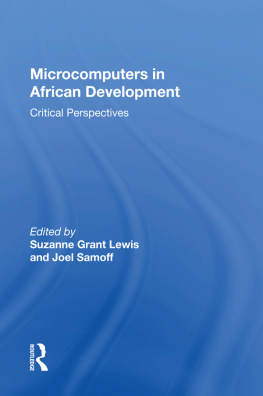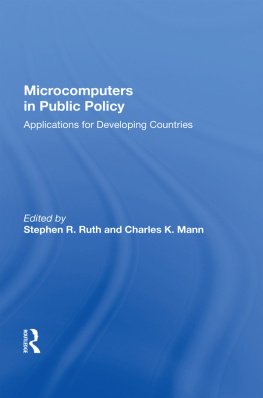Microcomputers in African Development
First published in 1992 by Westview Press
Published in 2021 by Routledge
605 Third Avenue, New York, NY 10017
2 Park Square, Milton Park, Abingdon, Oxon OX14 4RN
Routledge is an imprint of the Taylor & Francis Group, an informa business
Copyright 1992 by Taylor & Francis
All rights reserved. No part of this book may be reprinted or reproduced or utilised in any form or by any electronic, mechanical, or other means, now known or hereafter invented, including photocopying and recording, or in any information storage or retrieval system, without permission in writing from the publishers.
Notice:
Product or corporate names may be trademarks or registered trademarks, and are used only for identification and explanation without intent to infringe.
Library of Congress Cataloging-in-Publication Data
Microcomputers in African development : critical perspectives
edited by Suzanne Grant Lewis and Joel Sarnoff.
p. cm.
Includes bibliographical references (p. ) and index.
ISBN 0-8133-7934-2
1. MicrocomputersSocial aspectsAfrica. I. Lewis, Suzanne
Grant. II. Samoff, Joel.
QA76.M532 1992
303.4834096dc20
91-2047
CIP
ISBN 13: 978-0-3670-2182-5 (hbk)
ISBN 13: 978-0-3671-7169-8 (pbk)
DOI: 10.4324/9780429051685
To Paul and Rachel
Contents
, Suzanne Grant Lewis and Joel Samoff
2 Computerization, Aid-Dependency, and Administrative Capacity: A Sudanese Case Study, Craig Calhoun and Pamela F. DeLargy
3 Microcomputer Adoption in Tanzania and the Rise of a Professional Elite, Suzanne Grant Lewis
Appendix: Survey of Computers in Tanzania, Suzanne Grant Lewis and Mohammed Sheya
4 Fragile and Progressive Computer Contracts in Kenya and Ivory Coast: New Social Forms in the Workplace, Bennetta Jules-Rosette
5 Foreign Assistance Agencies as Advocates and Innovators, John A. Daly
6 Issues in Computer-Oriented Innovations in Zimbabwean Education, Kedmon N. Hungwe
7 The State, Computers, and African Development: The Information Non-Revolution, Bruce J. Berman
Bibliography
Index
- 2 Computerization, Aid-Dependency, and Administrative Capacity: A Sudanese Case Study
- 3 Microcomputer Adoption in Tanzania and the Rise of a Professional Elite
- Appendix: Survey of Computers in Tanzania
- 4 Fragile and Progressive Computer Contracts in Kenya and Ivory Coast: New Social Forms in the Workplace
- 5 Foreign Assistance Agencies as Advocates and Innovators
- 6 Issues in Computer-Oriented Innovations in Zimbabwean Education
- 7 The State, Computers, and African Development: The Information Non-Revolution
- Bibliography
- Index
Tables and Figures
Tables
3.1 Classification of Computer Systems in Tanzania
3.2 Growth of Institutionally and Individually Owned Microcomputer Systems in Tanzania by Year of Installation
3.3 Geographic Distribution of Computer Systems in Institutions in Tanzania
3.4 Distribution of Computers in Tanzania by Type of User and Source of Funding
3.5 Large Computer Systems in Tanzania by Manufacturer for Public and Private Sectors
3.6 Microcomputers in Tanzania by Manufacturer
3.7 Large Computer Systems in Tanzanias Public and Private Sectors by Year of Installation
3.8 Chronology of National Computer Developments in Tanzania
4.1 Typology of Exchanges for Computer Adoption
4.2 Computer Contracts and Exchanges in Ivory Coast and Kenya
5.1 Official Development Assistance by Classification of Donor ($ millions at 1986 prices)
5.2 Concessional and Non-concessional Flows from Multilateral Agencies ($ millions)
5.3 Membership of Governing Councils of U.N. Agencies, 1987
6.1 Profile of Surveyed Schools
6.2 Profile of Responding Schools
6.3 Distribution of Computers by Responsible Authority
6.4 Distribution of Computers by Responsible Authority and School Type
6.5 Schools with Computing Resources by School Gender Type
6.6 Accessibility of Computing Resources by Gender
6.7 Assessment of Need for Computers
6.8 Computers as Priority Within Schools
6.9 Alternative Priorities Listed by Schools
6.10 Expectation of Acquiring Computers Within Schools
6.11 Potential Sources of Computers Indicated
6.12 Categories of Anticipated Uses
Figures
3.1 Number of Microcomputers Present in Tanzania, 1980-1986
3.2 Geographic Distribution of Microcomputers in Tanzania, 1986
5.1 The Historical Introduction of Microcomputer Workstations and Personal Computers in USAID
About the Editors and Contributors
Bruce J. Berman is professor of political studies at Queens University in Kingston, Ontario, and has published on computers and political aspects of science and technology in Science as Culture, Artificial Intelligence and Society, and World Futures. He is the author of Control and Crisis in Colonial Kenya (1990).
Craig Calhoun is professor of sociology and director of international programs at the University of North Carolina at Chapel Hill. His recent work includes a book on the 1989 Chinese student movement and numerous articles concerning nationalism and social movements.
John A. Daly is acting director of USAIDs Office of Research. He has spent twenty years in development assistance after ten years of employment in the computer industry.
Pamela F. DeLargy is a research associate at the Carolina Population Center, University of North Carolina, whose recent work has focused on politics in population and health issues in the Horn of Africa. She is currently working on a USAID population project in Yemen.
Suzanne Grant Lewis is a Science, Engineering, and Diplomacy Fellow of the American Association for the Advancement of Science. She is assigned to the Bureau for Africa in USAID where she conducts analyses on the social and political aspects of education assistance programs, with particular attention to gender issues.
Kedmon N. Hungwe is a lecturer in the Faculty of Education, University of Zimbabwe, where he teaches courses in curriculum theory as well as media and technology. He has published several articles on media and technology.
Bennetta Jules-Rosette is professor of sociology at the University of California, San Diego. Her research interests include semiotic studies of tourism, tourist art, religious discourse, and new technologies in Africa. Her most recent book is Terminal Signs: Computers and Social Change in Africa (1990).
Joel Samoff is a visiting scholar at the Center for African Studies, Stanford University, and a consultant to the ILO-UNESCO Interagency Task Force on Austerity, Adjustment, and Human Resources. He is also a consultant to the Swedish International Development Authority on development, education, and microcomputers. His most recent book is Education and Social Transition in the Third World (1990), with Martin Carnoy.
Mohammed Sheya is director of technology development and policy at the Tanzania Commission for Science and Technology (COSTECH). He served on the Faculty of Engineering at the University of Dar es Salaam, prior to joining COSTECH.











